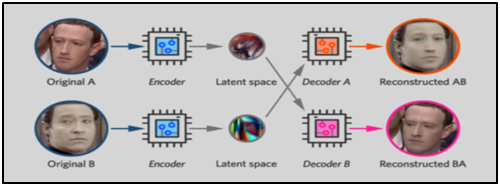Why in news?
In its first formal response to the use of deepfakes in this election season, the Election Commission of India (ECI) has told political parties not to share deepfake content on social media. If they find any, they must remove it within three hours and warn the person who shared it.
ECI hasn't told parties to stop using AI for campaign material. They just want them to avoid sharing misleading or false content that impersonates someone else.
What’s in today’s article?
- Deepfakes
- Statement issued by the ECI
What is Deepfake?
- About
- Deepfake uses deep learning techniques in AI to generate videos, photos, or news that seems real but is actually fake.
- These techniques can be used to synthesise faces, replace facial expressions, synthesise voices, and generate news.
- This technique is also used to create special effects in movies. However, more recently this technique is being widely used by criminals to create disinformation.
- E.g., in March 2022, Ukrainian President Volodymyr Zelensky revealed that a video posted on social media in which he appeared to be instructing Ukrainian soldiers to surrender to Russian forces was actually a deepfake.
- Working

- Deepfake techniques rely on a deep learning technique called autoencoder, which is a type of artificial neural network (ANN) which contains an encoder and a decoder.
- The input data is first decomposed into an encoded representation then these encoded representations are reconstructed into new images which are close to input images.
- Deepfake software works by combining several autoencoders, one for the original face and one for the new face
What the ECI has said on deepfakes?
- Flagging erosion of trust
- The use of manipulated, distorted, edited content on social media platforms has the potential to influence voters unfairly, divide society, and make people lose trust in the election process.
- It does so by attacking laid out instrumentalities of the electoral steps in terms of means and material.
- Protection of women
- ECI told parties not to share content on social media that included impersonation of another person, including political parties or their representatives.
- It also asked them not to post or support content that disrespects women or goes against their dignity.
- Reporting of fakes
- Parties have been asked to report unlawful information and fake user accounts that look like their official handles on social media platforms.
- Grievances committee
- If fake information or accounts stay on social media after reporting them, parties have been asked go to the Grievance Appellate Committee (GAC) under the Information Technology (Intermediary Guidelines and Digital Media Ethics Code) Rules, 2021.
- Last year, the IT Ministry set up three GACs for users unhappy with social media platforms' actions on their reports to get help.
- Three-hour deadline
- The ECI instructed political parties to remove any deepfake audios or videos they find within three hours of noticing them.
- They should also identify and warn the person responsible within their party.
What remains unclear in ECI’s statement?
- Real outcomes
- The ECI has chosen to react after two phases of the election are already over — whereas deepfakes have been shared by parties from long before that.
- Also, what real impact the ECI’s letter has in curbing the menace remains to be seen.
- Uncertain language
- It is unclear what the Commission means by saying that parties should take down deepfakes when it comes to their notice, when it is the parties’ official handles themselves that are sharing the content.
- Also, the advice to warn the person responsible for sharing such content is vague.
- It appears to be lacking teeth, besides suggesting the existence of free agents within parties with access to official handles.
- Status on other social media platforms like WhatsApp
- The ECI’s letter covers content shared on social media platforms such as Facebook, X, and Instagram.
- However, it is unclear what is being done about deepfake-led disinformation being circulated on secure messaging platforms like WhatsApp.
- WhatsApp is used by more than 500 million users in India, and is perhaps the most effective way to spread misinformation/ disinformation.
- Direct AI-based calls
- Parties have been using AI-based real-time calls to voters.
- These calls happen outside the purview of social media platforms, but can be potentially weaponised by parties or candidates.
- The ECI’s letter does not deal with this aspect.










